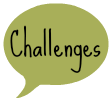Language is a big part of what makes us human. So, of course, people like to think and talk about talking. But most people haven't had the advantage of studying linguistics in school and aren't familiar with what linguists do. So I'm issuing an open invitation to anyone who is curious about language: send me your questions, thoughts and musings, and I'll do my best to answer with as little jargon as possible! Also, if you overhear someone talking in an interesting way, or making an interesting slip of the tongue, tell me about it!
To send me a question: email me, tweet me, Facebook me, comment on a post, send me a smoke signal...whatever works!
Here's a catalogue of all my language-related posts for easy browsing.
Talking Funny: A series on the diversity of language.
August 27, 2013: Thai tones
August 20, 2013: Fula noun classes and consonant mutation
Miscellaneous language posts.
February 20, 2014: That's so meta(phor)! In this post I talk about how concrete words can develop abstract meanings over time through the mechanism of metaphor (it's not just for poets!).
September 30, 2013: To creak or not to creak? I discuss the phenomenon of creaky voice--what it is, what functions it can have in English, and what we know about its spread. It's not just for teenage girls!
July 31, 2013: Good grammar, bad language. I explain why all dialects have equally "good grammar" in the eyes of a linguist, and why people who complain about "bad grammar" are really making a social judgment.
May 23, 2013: Regular mice. In this post I explain how irregularities in language arise through accidental combinations of regular developments. As a case study I show how English irregular plurals like mice and feet came to be.
April 29, 2013: Haphazard hypercorrection. In this post I describe the phenomenon called hypercorrection, where people misapply language forms that have high social prestige. Hypercorrection is not a new thing--the Roman poet Catullus wrote about it.
April 8, 2013: Wing, wang, wung? I overhear a new irregular verb, wung, as in "We didn't have a script so we just wung it." The source of this new word must be analogy: the process of remaking one part of your language to make it more similar to another part.







Hey, think your blog is great! Was just wondering what exactly it means to say that a phoneme is 'stable' or 'unstable'? Thanks!
ReplyDelete